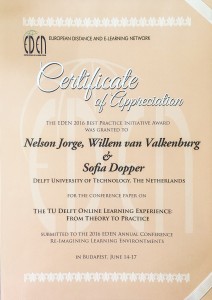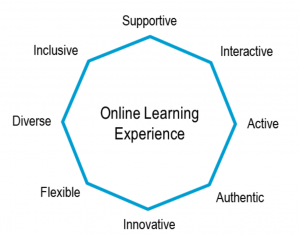Posts tagged online learning experience
Exploring Personal Experience and Value Creation in Postdigital Education: Insights from a Large-Scale MOOC Survey.
Article written by Ali Soleymani, Maarten De Laat and Marcus Specht. This is a preprint (version 1); it has not been peer reviewed by a journal.
Abstract
This study investigates students’ online learning experiences based on their perception of the value this course creates for them through a comprehensive analysis of responses from 1227 participants in MOOCs offered by the Extension School of the Technical University of Delft. Utilizing the value creation framework by Wenger, Trayner, and De Laat (2011) , the research explores the immediate, potential, applied, realized, and transformative value creation cycles. Our findings reveal significant insights into the multifaceted impacts of study behavior on learners’ perceptions. Participants reported benefits such as skill acquisition, professional development, and enhanced confidence while highlighting areas needing improvement, such as practical application opportunities and course relevance. This study highlights the importance of aligning MOOC content with learner needs and providing ongoing support tomaximize the educational value online courses can offer them. These insights contribute to understanding educational value in the postdigital age, advocating for the development and support of MOOCs to foster continued personal and professional growth.
Keywords
Value Creation Framework, Postdigital Education, MOOCs, Online Assessment
Reference
Soleymani, A., De Laat, M., & Specht, M. M. (2024) EXPLORING PERSONAL EXPERIENCE AND VALUE CREATION IN POSTDIGITAL EDUCATION: INSIGHTS FROM A LARGE-SCALE MOOC SURVEY., Preprint (Version 1) available at Research Square
https://doi.org/10.21203/rs.3.rs-5043440/v1
Download
License
This is an Open Access article, distributed under the terms of the Creative Commons Attribution 4.0 International licence (https://creativecommons.org/licenses/by/4.0/), which permits reusers to distribute, remix, adapt, and build upon the material in any medium or format, so long as attribution is given to the creator. The license allows for commercial use.
Shifting from Blended to Online Learning: Students’ and Teachers’ Perspectives
Article written by Esra Polat, Sonja van Dam and Conny Bakker and published in the Proceedings of the Design Society.
Abstract
The Covid-19 outbreak forced many universities across the world to transition from a traditional or blended format to fully online education. This paper presents a case study on the transition to an online education format for a circular design course. Both quantitative and qualitative data were collected through a survey with 26 students and interviews with six course teachers. The findings revealed that students preferred the on-campus versions over the online course components. They indicated the perceived lack of motivation, lack of sense of community, and a high workload as influencing factors. Teachers indicated the lack of connection with students as a drawback to online education but identified advantages to their teaching and the student’s learning experience. Suggestions for addressing an optimal blended course format are provided.
Keywords
Design education, Online learning, Circular economy, Case study, Covid-19
Reference
Polat, E., Van Dam, S., & Bakker, C. (2021). SHIFTING FROM BLENDED TO ONLINE LEARNING: STUDENTS’ AND TEACHERS’ PERSPECTIVES. Proceedings of the Design Society, 1, 2651-2660. doi:10.1017/pds.2021.526
Download
License
This is an Open Access article, distributed under the terms of the Creative Commons Attribution-NonCommercial-NoDerivatives licence (http://creativecommons.org/licenses/by-nc-nd/4.0/), which permits non-commercial re-use, distribution, and reproduction in any medium, provided the original work is unaltered and is properly cited. The written permission of Cambridge University Press must be obtained for commercial re-use or in order to create a derivative work.
A Paradigm Shift in Teaching Aerospace Engineering: From Campus Learners to Professional Learners
Article “A Paradigm Shift in Teaching Aerospace Engineering: From Campus Learners to Professional Learners – a Case Study on Online Courses in Smart Structures and Air Safety Investigation” presented at 2018 AIAA Aerospace Sciences Meeting 8–12 January 2018 in Kissimmee, Florida.
Abstract
In this paper, the transition from teaching on-campus to an online audience consisting of working professionals in an Aerospace Engineering context is described. The differences in the learner’s needs and the transition in teaching methods and style that is required from teaching staff is discussed. This is illustrated by two case studies: for Smart Structures and for Air Safety Investigation. Recommendations on how universities can contribute to Life Long Learning are given.
Keywords
aerospace engineering, online education, pedagogical model, mooc, lifelong learning, professional education
Reference
Saunders, G., Rans, C., Schuurman, M., De Breuker, R., & van Staalduinen, J-P. (2018). A Paradigm Shift in Teaching Aerospace Engineering: From Campus Learners to Professional Learners – a Case Study on Online Courses in Smart Structures and Air Safety Investigation. In 2018 AIAA Aerospace Sciences Meeting 8–12 January 2018, Kissimmee, Florida. [AIAA 2018-0810] AIAA. DOI: 10.2514/6.2018-0810
Download
The TU Delft Online Learning Experience: From Theory to Practice
 Paper presented at the EDEN Annual Global Meeting 2016 in Budapest, Hungary from 15-17 June 2016. At the conference Gala Dinner the paper received the EDEN 2016 Best Practice Initiative Award.
Paper presented at the EDEN Annual Global Meeting 2016 in Budapest, Hungary from 15-17 June 2016. At the conference Gala Dinner the paper received the EDEN 2016 Best Practice Initiative Award.
Introduction
In 2014 TU Delft started an innovation programme to educate the world and improve quality of education based on online learning. The programme included open (OpenCourseWare and MOOCs) and online (Professional Education, Bachelor and Master) courses. Lecturers of TU Delft have shared their knowledge in MOOCs with more than 750,000 learners around the world. Next to the open courses, more than 800 learners enrolled in our online courses. Adopting new instructional strategies based on online learning elements has had a very positive impact in TU Delft’s overall education, benefiting traditional on campus education and contributing to the changing need in educating engineers (Kamp, 2014). Naturally, blended learning has arisen on campus, where online learning materials are reused in a flipped classroom approach with very positive results: higher completion rates, higher average grade, more flexibility for students to interact with the course material and more flexibility for teachers in choosing which elements to include in the interactive classroom sessions (van Valkenburg, 2015).
The development of TU Delft online courses is based on the Online Learning Experience (OLE), a pedagogical model that supports the development of our courses and strives for increasing quality. The creation of the OLE was an important step for TU Delft, contributing to the development of online courses in a more systematic and consistent way, guiding all course development teams through the realisation of several shared educational principles.
Last year, when we presented the OLE at the 2015 EDEN Conference in Barcelona, we were still at an early stage of its development, collecting fundamental background to support it and feedback from online learning experts. Although we only had a collection of ideas translated into 8 principles, it was clear that the model needed to be flexible in order to accommodate many educational scenarios that coexist among TU Delft’s Faculties, but with a clear and useful purpose to help improve the quality of our online education (Jorge, Dopper & van Valkenburg, 2015). This paper describes how the OLE is applied in practice.The main goal of the OLE is to improve the quality of our online education by setting course design and development principles to support course teams. At the same time, the OLE can be used as a tool to promote reflection before the course starts to set expectations, and in the end to evaluate and plan improvements for the next run. In the next sections we’ll describe the OLE in both ways – as course design principles (guidelines) and as a tool (the radar graph).
Reference
Jorge, Nelson; Van Valkenburg, Willem; Dopper, Sofia (2016). The TU Delft Online Learning Experience: From Theory to Practice in Teixeira, Szucs and Mazar (2016). Conference Proceedings EDEN 2016 Annual Conference. ISBN 978-615-5511-10-3. License CC-BY 4.0
Download
- Download Paper (PDF)
- Explaining the model (PDF)
- Prezi slides
video of teacher’s perspective of Online Learning Experience:
EMOOCS2016: Guidelines for Evaluating the Teaching and Learning in MOOCs: a TU Delft approach
Paper presented at the EMOOCS 2016 conference in Graz, Austria.
Abstract
What does it mean to qualify as a ‘successful’ MOOC? This question haunts policy makers and educators alike, and is at the core of the continued development and funding for Massive Open Online Courses. Because MOOCs can serve many purposes, their value lies in more than just their short-term educational role. A ‘successful’ MOOC can do more than just teach; it can provide institutional brand recognition, address global challenges, improve the quality of campus education, and generate data for educational research. In this paper, we examine the
methods and tools TU Delft uses to evaluate the teaching and learning within its own MOOCs in particular. Recommendations are provided for the use of a set of qualitatitve tools in addition to the more common quantitative tools used to evaluate the ‘success’ of a MOOC.
Reference
Marquis, Danika; Kiers, Janine; Meijerink, Leonie (2016). Guidelines for Evaluating the Teaching and Learning in MOOCs: a TU Delft approach. In Proceedings of the EUROPEAN STAKEHOLDER SUMMIT on experiences and best practices in and around MOOCs (EMOOCS 2016). http://emoocs2016.eu/wp-content/uploads/2016/02/proceedings-emoocs2016.pdf. ISBN 9783739237107 (page 447-459)
Slides
Paper
Paper is part of the conference proceedings (page 447-459)
Defining a Pedagogical Model: The TU Delft Online Learning Experience
 This paper was presented at the EDEN 2015 conference in Barcelona from 9-12 June 2015 by Nelson Jorge, Sofia Dopper and Willem van Valkenburg.
This paper was presented at the EDEN 2015 conference in Barcelona from 9-12 June 2015 by Nelson Jorge, Sofia Dopper and Willem van Valkenburg.
Abstract
In early 2014, the Delft University of Technology (TU Delft) started an innovation program with the aim to respond even more effectively to recent developments in open and online education. Drawing on the fields of Distance Education research and the university’s vision of the “engineer of the future”, TU Delft’s Extension School created a unified pedagogical model – the Online Learning Experience (OLE) – contributing to greater consistency in the development of online courses. Continue reading
